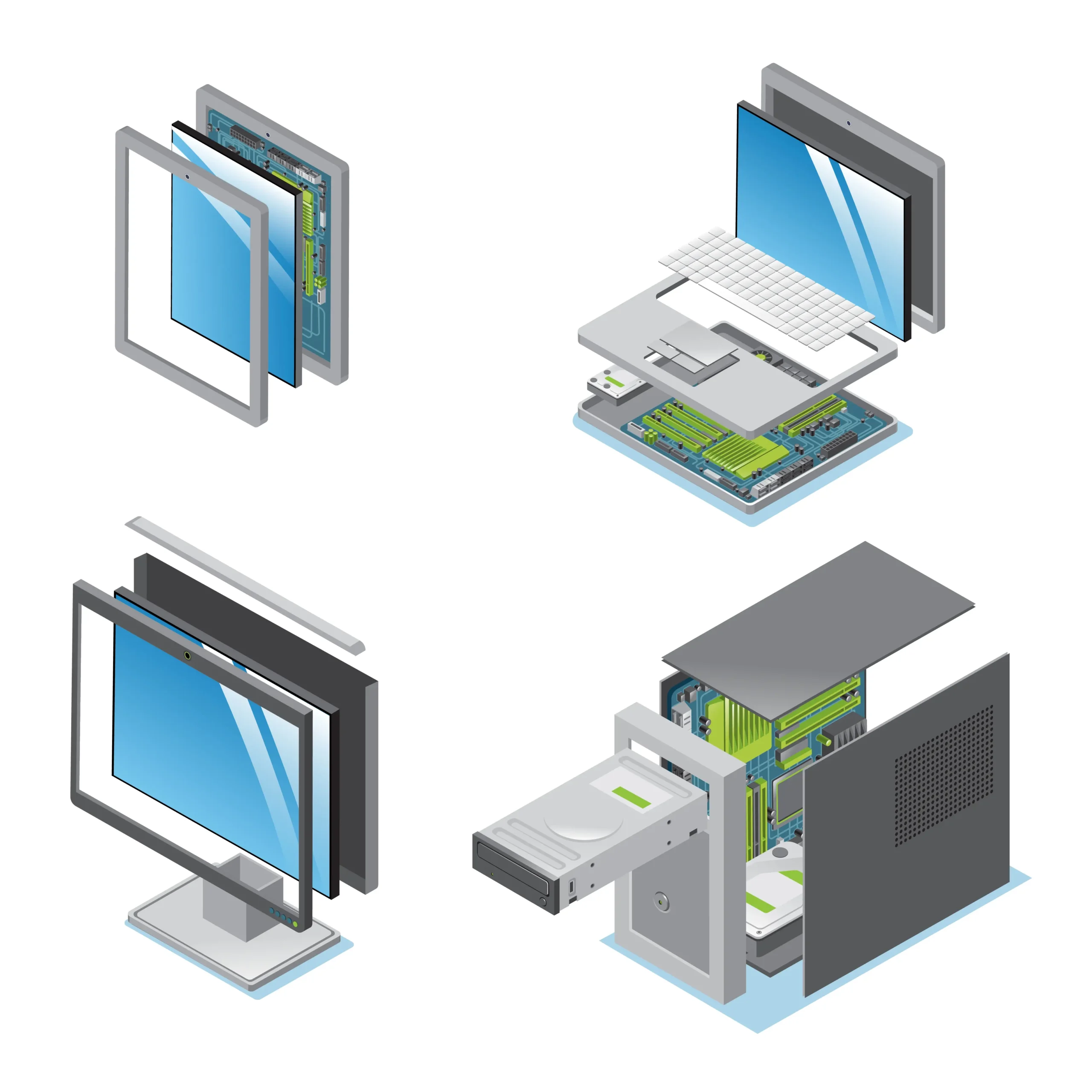Hybrid Computer
Hybrid Computer :- The modern computer age has brought us devices packing unbelievable processing power. Yet even the mightiest supercomputers struggle with complex analog processes like pattern recognition or fluid dynamics simulations. That’s where hybrid computers come in – combining analog components with digital computing to achieve the best of both worlds. This guide explores the different types of hybrid systems and their game-changing applications across science, engineering, and more.
Types of Hybrid Computers
Hybrid computers integrate analog data inputs and outputs with digital computing and storage. This fusion of analog versatility and digital precision enables hybrid systems to outperform either pure analog or digital setups for specialized tasks involving both data types, learn Types of Computer Memory as well as.
There are two main classes of Hybrid computers:

1.Large Electronic Hybrid Computers
The earliest electronic hybrids from the 1960s were room-sized arrays of analog components like operational amplifiers, function generators, comparators, and servo systems, controlled by digital computers. They were complex, expensive machines focused on scientific and engineering applications like aerospace system testing or weather modeling requiring precision analog inputs/outputs.
Modern large electronic hybrid computers follow similar architectures but utilize integrated analog/digital chips driving high-resolution graphics cards for analog computation. Their niche is still high-end simulation and analysis, like computational fluid dynamics or aircraft design.
![]()
2.General Purpose Hybrid Computers
Smaller desktop hybrid computers gained popularity in the 1980s, combining personal computer technology with dedicated analog inputs/outputs on expansion cards. These affordable “hybrid desktops” brought hybrid computing to broader audiences.
Later desktop hybrid computers incorporated microcontrollers or DSP chips for analog I/O directly on motherboards or dedicated hybrid daughterboards. These general-purpose hybrid PCs have wide applications – from Internet-of-Things devices to computerized lab instruments to rapid control prototyping platforms.
Now, understanding this concept is simple and entertaining for Hasons. Using the Hason website you can always stay one step ahead in your job, business, or studies by purchasing New Age Desktops and All in One Desktops, i3 Intel Core Processor Desktop starting from 15000/-. Monitors, CPUs, and Gaming Desktop are also available. Register on Hasons and order your Tech Partner Now. Get exciting offers and benefits on your every purchase. Contact us so our support team can guide you in purchasing the right Tech Partner.
Aurora I3-16R Desktop
I3 16gb Ram 4th Gen 1 TB HDD With 2gb Graphic Card | Motherboard Chipset H81/ Wired Keyboard And Mouse/ Windows 10/Black, Screen 18.5
Rs.20,999.00
Examples of Hybrid Computers
Hybrid machines have powered innovations across the sciences, engineering disciplines, and more. Here are some trailblazing examples:
Cray Hybrid Supercomputer :- Cray’s 2010 Dynamical Exascale Entry Platform (DEEP) combines digital supercomputing architecture with an analog Very Large Scale Integration (VLSI) system, massively accelerating fluid dynamics and nanoparticle research.
Hybrid Weather Computer :- The University of Wisconsin’s hybrid computer system blends an analog column with digital analysis to study small-scale weather phenomena down to microscopic cloud processes.
Neuromemristive Hybrid Computer :- Developed at UC San Diego, this hybrid computer uses analog resistive memory technology to model neurological learning processes digitally unachievable even with supercomputers.
Quantum Hybrid Computer :- Startup Quantum Brilliance is developing hybrid quantum-classical computers, marrying analog quantum processors for targeted tasks with classical digital computers managing total workflows.
Advantages of Hybrid Computers
What sets hybrid computers apart? Here are some of their signature benefits:
Precision :- Hybrid computers handle analog signals with high accuracy, over 1 part in 10,000, whereas analog computers alone accumulate signal noise.
Programmability :- Unlike pure analog setups, hybrid systems allow adjustable parameters and automated testing via digital programming.
Scalability :- Hybrid computers can model vast datasets covering wide timespans by leveraging lightning-fast digital computing.
Adaptability :- Users can reconfigure hybrid components to match specialized I/O needs for custom problems
Cost :- Smaller desktop hybrid computers are affordable for small labs and bootstrapped startups
Clearly, hybrid computers deliver specific advantages traditional analog or digital systems can’t match. Next, we’ll explore how they differ.
Difference Between Analog, Digital, and Hybrid Computers
- Analog computers represent data as continuous voltage signals. They excel at modeling smooth processes in the physical world but lack programmability and noise immunity.
- Digital computers encode data digitally as discrete binary values for precision and programmability, but can’t smoothly handle analog inputs natively.
- Hybrid computers integrate both models, using analog components to link real-world variables with digital computing/storage. This enables handling complex analog signals impossible singly with either analog or digital machines.
- For specialized applications involving analog I/O, hybrid computers deliver best-in-class performance.
Applications of Hybrid Computers
What can these fusion systems accomplish? Hybrid computers enable breakthroughs across science and engineering realms:
1.Engineering Design and Testing
From verifying airplane wing designs to optimizing race car shock absorbers, engineering teams use hybrid computers to fuse physical prototypes with computational modeling for superior results over either method alone.
2.Control Systems Development
Hybrid computers help engineers rapidly prototype analog control systems – like autonomous vehicle sensors or IoT-connected precision agriculture systems – with adjustable parameters.
3.Weather and Environmental Modeling
By combining actual environmental sensor data with advanced digital simulation techniques, hybrid forecasting systems outperform pure numerical weather prediction models.
4.Brain-Computer Interfaces
Emerging neuromemristive hybrid technologies combining memristor-based analog chips with digital processors mirror neurological systems for brain-machine interfacing breakthroughs.
5.Hybrid Classical/Quantum Computing
Hybrid quantum-classical architectures overcome limitations of early quantum computing hardware by integrating them into traditional supercomputing workflows for an extra boost.
The Future with Hybrid Computers
In an increasingly digitized era, analog data isn’t going away – from vital signs in medical tech to real-time sensor feeds in self-driving cars. Hybrid computing blends these analog signals with digital prowess for the best of both spheres.
Ongoing hybrid computing developments like neuromemristive chips or quantum-digital systems will only expand practical applications. As analog/digital fusion platforms, hybrid computers uniquely meet specialized modeling and control challenges today’s pure digital devices can’t always handle alone.
Bridging the analog and digital divide, hybrid systems open new frontiers everywhere from fundamental research to biotech breakthroughs to tomorrow’s IoT-connected infrastructure. The future of computing may increasingly rely on this potent hybrid advantage.
| If you are reading Hybrid Computers then also check our other blogs: | |
| Computer Virus | WiFi Adapter for PC |
Hybrid Computer
- What are hybrid computers used for?Hybrid computers are ideal for applications involving both analog and digital data - like laboratory instrumentation, process control systems, and engineering modeling/testing with real-world prototypes. Their fusion design bridges analog and digital domains for precision results not achievable with either technology individually.
- What is the purpose of hybrid computers?The purpose of hybrid computers is to harness the respective strengths of analog versatility and digital computing/storage in tackling specialized problems involving both data types. This makes them well-suited to simulation, forecasting, design optimization, control systems, and other tasks integrating real-time analog signals with digital analysis.
- What are some examples of hybrid computers?Some groundbreaking examples include the Cray hybrid supercomputer optimizing fluid/nanoparticle simulations; The University of Wisconsin's analog column-digital analysis hybrid weather computer; UC San Diego's neuro memristive platform mimicking brain structure; and startups like Quantum Brilliance developing quantum-classical hybrid systems. These showcase hybrid computers' versatility across cutting-edge science and engineering.

